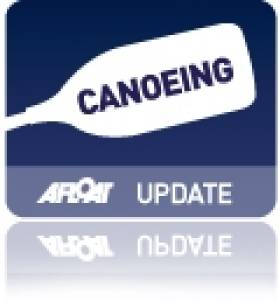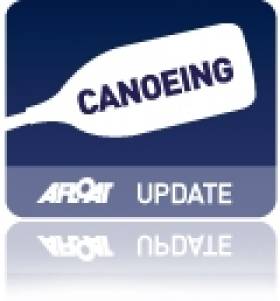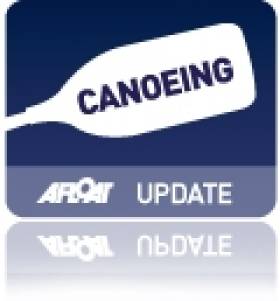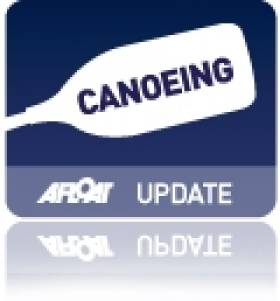Displaying items by tag: Heurteau,
Heurteau Sole Irish Qualifier at Augsburg World Cup
# CANOE SLALOM WORLD CUP: Ciaran Heurteau was Ireland’s sole qualifier for the semi-finals on the first day of the canoe slalom World Cup in Augsburg, Germany. Heurteau, who has an Irish mother but was brought up near Paris, secured his place with his first run, and finished 23rd of the 40 qualifiers on a difficult course. Eoin Rheinisch placed 49th, missing a semi-final for the second successive World Cup. He also missed out in Cardiff.
Liam Jegou, who is just 17, did well but was disappointed with placing 44th in the men’s C1. Hannah Craig fell ill and did not compete in the women’s K1.
Canoe Slalom World Cup, Augsburg, Germany, Day One (Irish interest)
Men
K1 – Heats (First 40 Qualify for Semi-Finals): 1 Slovenia (P Kauzer) 98.22 secs; 23 C Heurteau 104.42 (incl 2 sec pen; 1st run); 49 E Rheinisch 107.52 (2nd run); 61 P Hynes 114.76 (2nd Run);
C1 – Heats (First 20 Qualify): 44 L Jegou 118.32 (incl 4 sec pen; 2nd run).
Women
K1 – Heats: H Craig did not start.
# CANOEING: Eoin Rheinisch and Ciaran Heurteau qualified for tomorrow’s semi-finals of the K1 at the Canoe Slalom World Cup in La Seu d’Urgell in Spain.
Both Ireland competitors did enough in their first runs in the heats to progress, but Rheinisch greatly improved his first-run ranking of 15th by clocking a hot time of 84.98 seconds in his second run to move up to fourth. Hearteau, who stood in 25th after the first round, could not improve in his second run and finished 37th overall.
Two Ireland competitors at the Canoe Sprint European Championships in Zagreb qualified for B Finals. Barry Watkins finished sixth in the semi-final of the K1 500 metres and Jenny Egan eighth in her semi-final of the women’s K1 500.
Canoe Slalom, World Cup Three, La Seu d’Urgell, Spain (Irish interest)
Men
K1 Men Heats (First 40 to Semi-Finals): 1 Australia (W Forsythe) 84.09; 4 E Rheinisch 84.98 (2nd run); 37 C Heurteau 88.03 (first run).
Canoe Sprint European Championships, Zagreb, Croatia (Irish interest)
Men
K1 1,000m – Heat One (First to Final; 2-7 to semi-final): 7 B Watkins 3 mins 59.395 seconds. Semi-Final (First Three to Final): 6 Watkins 3:38.294.
K1 500 – Heat Three (First to Final; 2-7 to semi-final): 4 Watkins 2:00.066. Semi-Final One (First Three to A Final; 4-7 and next fastest to B Final): 6 Watkins 1:42.767.
Women
K1 500
Heat Two (First to Final; 2-7 to Semi-Final): 6 J Egan 2:10.997. Semi-Finals (First Three to A Final; 4-7 and next fastest to B Final): 8 Egan 1:59.143 (qualified for B Final)
#CANOEING: Ciaran Heurteau first represented Ireland in 2006, but he reached new heights today when he finished fifth in the canoe slalom World Cup final in Pau in the Pyrenees.
The 24-year-old, who was brought up in Paris but has an Irish mother, qualified for the final by finishing third in the semi-final, and he competed well. Chasing an exceptional mark of 100.17 seconds set by Etienne Daille of France, Heurteau came down the course in 102.32 seconds, but he had touches on gates 12 and 24 (the second last on the course), which resulted in four seconds in time faults. Daille took gold, while Heurteau was less than a second off a bronze medal.
Canoe Slalom World Cup, Pau, France (Irish interest)
Men,
K1 Semi-Final (First 10 to Final) : 3 C Heurteau 101.74; 22 E Rheinisch 106.90
Final: 1 France (E Daille) 100.17, 2 Czech Republic (J Vondra) 101.46, 3 Australia (L Delfour) 105.40; 5 Ireland (C Heurteau) 106.32.
# CANOEING: Ciaran Heurteau gave an outstanding performance for the second day in succession to reach the final of the Canoe Slalom World Cup in Pau in France. Heurteau had finished 13th in the heats to make the semi-finals, but he bettered that this morning, finishing third in 101.74 seconds. Eoin Rheinisch also touched no gates in his round, but his time of 106.90 placed him in 22nd, with just 10 going through to the final.
Canoe Slalom World Cup, Pau, France (Irish interest)
Men, K1 Semi-Final (First 10 to Final) : 3 C Heurteau 101.74; 22 E Rheinisch 106.90
































































